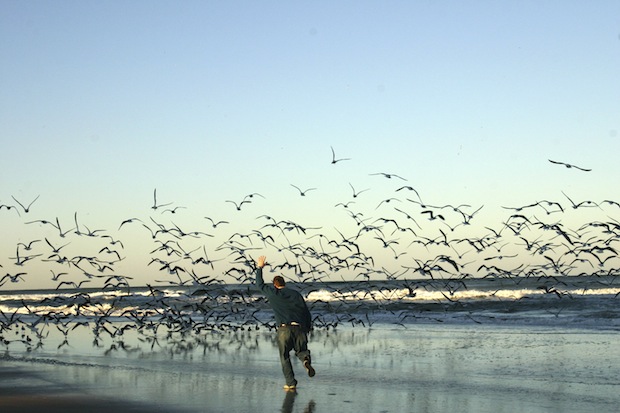I went to a Tibetan yoga all-day workshop. Tibetan yoga is very simple. It would be hilariously so if it didn’t hurt as much. For the first hour we stood and very slowly raised our hands — as slowly as a satellite seen from the earth on a starry night, was the advice given — from down by our sides until they met above our heads. For the second hour we lowered them back down again to their starting point. After a frugal lunch we stood and swung our heads in a fast tempo from left to right and back, and for the final hour we nodded them up and down. Then we went home.
When I got home, the grandson was there clamouring to be entertained, so I took him out for a stroll along the promenade to see what we could see. As we looked right and left, my head swivelled easily on every plane, like a chameleon’s. Along the way we passed an old floating mine from the last war, painted coral pink and set up as a war memorial and gigantic collecting tin. ‘What’s that?’ said the grandson, now almost four and wanting explanations.
‘Well,’ I said. ‘About 70 years ago, we tried to kill as many Germans as we possibly could, and they tried to kill as many of us as they could. And one of the ways they tried to kill us was to float things like this in the sea — it’s called a mine — and when one of our ships ran over it, the mine would explode and make a hole in the ship. The sea would rush into the hole, the ship would sink to the bottom of the sea, the people on the ship would be killed, and then we’d have to kill even more Germans to make up for it.’
He walked on in silence, head down, while he absorbed yet another surprising piece of information about the nation among whom he had found himself. Finally he said, querulously, ‘Well, that’s not very good, is it?’
It was my turn then to walk on in silent contemplation.
A censorious conclusion, I thought, and horribly unlike him. I have always looked up to this golden lad and tried to see the world through his fresh, ecstatic young eyes. Whenever I succeeded, I saw a world that is delightful and mysterious. And one of the reasons for that was the refreshing absence of a pat morality. Good and evil, beauty and ugliness simply didn’t exist. It was like going around with pint-sized Nietzsche for a companion.
If he hadn’t answered in the way he had, I might have replied, as an interesting point of view, rather than as a judgment, ‘Not very good perhaps, Oscar, but in many ways splendid and we’ve respected each other ever since.’ But here he was, not yet four, and already he has signed on the dotted line, and his application to join the moral community is in the post. Why does there come a point in every passionate relationship when some inane po-faced moral judgment comes as a slap in the face and the excitement evaporates. This wasn’t that, but it was a sinister prelude to it. Disappointing.
Further along we came upon a self-consciously yobbish party of herring gulls standing on the promenade unsure of whom to terrorise next or where their next mouthful was coming from. I have encouraged in Oscar an ungrudging awareness of the existence of other species besides his own. (We have visited the zoo that many times, for example, I thought I saw a glint and focus of recognition in the pinhead eyes of the minuscule poison dart tree frog the last time we peered in at him through the warm glass.) Ungrudging, that is, except in the case of those filthy robbing bastards the seagulls. These I encourage him to make war on without quarter by any means available — which he enjoys.
‘Bloody seagulls think they own the place,’ I said, flapping my arms at them to at least disturb their minds a little. My arms felt so limber in their sockets and supple at the joints the momentum gained was greater than expected and I momentarily lost all control over them. With nothing handy to brandish or throw at them, such as a loose paving slab or a scaffolding pole, we roared like angry lions and charged. With the usual dismal result. At the last moment they flapped themselves contemptuously a few feet into the air and settled again ten yards further off. Only this time with the difference that they threw back their heads in a shrieking, caterwauling chorus of obscene imprecation. ‘Don’t listen to them,’ said Oscar angrily, through gritted teeth.
Got something to add? Join the discussion and comment below.
Get 10 issues for just $10
Subscribe to The Spectator Australia today for the next 10 magazine issues, plus full online access, for just $10.
You might disagree with half of it, but you’ll enjoy reading all of it. Try your first month for free, then just $2 a week for the remainder of your first year.















Comments
Don't miss out
Join the conversation with other Spectator Australia readers. Subscribe to leave a comment.
SUBSCRIBEAlready a subscriber? Log in